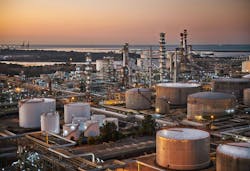Spain’s Cepsa venture doubling renewable fuels production in Huelva
Cepsa Bioenergia San Roque SLU (CBSR), a joint venture of Compañía Española de Petróleos SAU (Cepsa) and Singapore-based RGE Pte. Ltd.’s AAA Oils & Fats Pte. Ltd. (Apical Group) renewable energy subsidiary Bio-Oils Energy SA has let a contract to Worley Ltd. to deliver services for a new renewable fuels plant to be built next to Cepsa’s La Rábida industrial energy park at the Port of Huelva in Palos de la Frontera, Huelva, in Spain’s southernmost autonomous community of Andalusia.
As part of the Aug. 26 contract, Worley will provide engineering, procurement, and field engineering support services for CBSR’s new plant that, once operational, will produce 500,000 tonnes/year (tpy) of renewable diesel—or hydrogenated vegetable oil (HVO)—and sustainable aviation fuel (SAF) from a feedstock of agricultural waste and used cooking oils (UCO), the service provider said in a filing to the Australian Securities Exchange.
Worley said its scope of work under the contract—which also will benefit expanded operations of Bio-Oil Energy’s existing 500,000-tpy renewables fuels plant co-located at the site—will cover feedstock pretreatment installations, outside battery limit (OSBL) fuel pretreatment units, and a wastewater treatment plant.
Scheduled for startup in 2026, CBSR’s plant will boost overall production of the combined renewable fuels complex to 1 million tpy, making it southern Europe’s largest second-generation biofuels plant, Cepsa and Apical said separately.
Worley did not reveal the value of the contract.
Project background
This latest contract for the project follows CBSR’s previous award of detailed engineering for the proposed plant to Técnicas Reunidas SA in first-quarter 2023, according to an Apr. 25, 2023, release from Cepsa.
As part of the 2023 agreement, Cepsa said Técnicas Reunidas will provide engineering, procurement management, and construction management support for the new plant, with the service provider’s scope of work specifically to cover the renewable fuels unit (RFU), the amine regeneration unit (ARU), the acid water unit (SWS), the service generation units, interconnections, a storage tank farm, as well as the ship-and-tanker loading and unloading installations to be built as part of the project.
More recently, in late-June 2024, Cepsa confirmed the European Investment Bank (EIB) entered a €285-million loan agreement for the project as part of EIB’s commitment to investing in private companies within the European Union (EU) advancing their own decarbonization strategies in line with accelerating the energy transition.
A core component of Cepsa’s 2030 Positive Motion decarbonization strategy that outlines a corporate goal of producing 2.5-million tpy production in Spain and Portugal by 2030, CBSR’s proposed €1.2-billion renewable fuels plant project is also supported by InvestEU, an EU program to mobilize more than €372 billion of additional investment in the period 2021-27 based on the project’s meeting the program’s main objectives of developing the EU energy sector and a sustainable bioeconomy, Cepsa said.
The new plant, which will secure most of its feedstock supply from Apical's agricultural waste and residue operations via a long-term agreement, will be equipped to process as much as 600,000 tpy of mixed organic waste, Cepsa said in a June 27 release.
With construction activities initiated earlier this year, CBSR’s renewables plant is designed for minimal environmental impact, as plant processes will be powered with renewable hydrogen and 100% renewable electricity, feature alternative heat-recovery and energy efficiency systems, and—due to installation of an advanced water-treatment plant—only use reclaimed water that limits impacts to the surrounding ecosystem, Cepsa confirmed in a February 2024 release.
Alongside SAF and HVO, the plant will also produce biogas, a raw material for production of green hydrogen essential for decarbonizing operations of both the plant and the adjacent La Rábida energy park.
Biogas treatment at the proposed plant additionally will enable capture of biogenic CO2 for production of green methanol for decarbonizing maritime transport as part of the Cepsa-led Andalusian Green Hydrogen Valley ecosystem program, the operator said.
Broader transformation
While it has produced biofuels across its conventional refining system for more than a decade, Cepsa began producing HVO at its La Rábida energy park—one of two now belonging to the operator that also houses the company’s 11.1-million tpy La Rábida refinery—in 2022 using a feedstock of UCO, the company said in a Sept. 30, 2022, release.
Cepsa’s current move to aggressively expand renewable fuels production follows the operator’s realignment of its business objectives following decreased demand for hydrocarbon-based products resulting from the global Covid-19 pandemic.
Post-pandemic, the operator has committed to focusing on transformation of its remaining two Spanish downstream energy parks—which, in addition to La Rábida, includes the San Roque energy park in Cádiz province that houses the 12-million tpy Gibraltar-San Roque refinery—for production of renewable fuels and green hydrogen, Cepsa said in its 2023 annual report.
About the Author
Robert Brelsford
Downstream Editor
Robert Brelsford joined Oil & Gas Journal in October 2013 as downstream technology editor after 8 years as a crude oil price and news reporter on spot crude transactions at the US Gulf Coast, West Coast, Canadian, and Latin American markets. He holds a BA (2000) in English from Rice University and an MS (2003) in education and social policy from Northwestern University.

